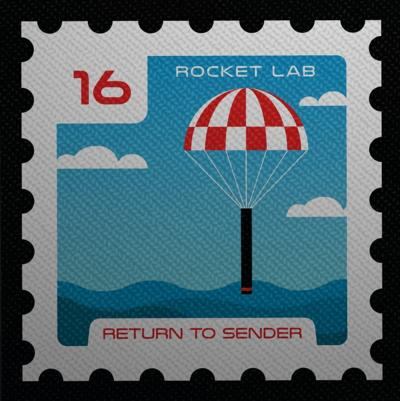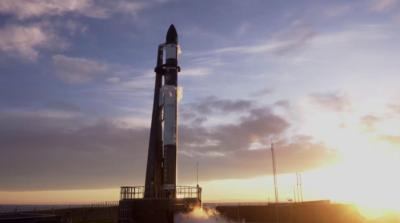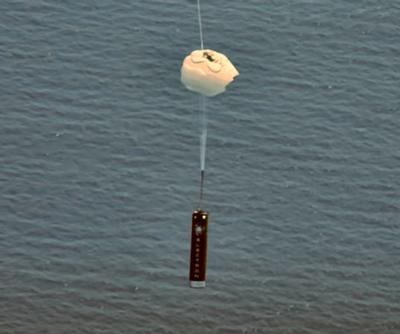Attempt Will Bring Electron’s First Stage Back To Earth Under A Parachute System
Rocket Lab has confirmed that it will attempt to recover the first stage of its Electron rocket during its next mission, the ‘Return to Sender’ launch, scheduled for lift-off in mid-November.

The test will see Rocket Lab attempt to bring Electron’s first stage back to Earth under a parachute system for a controlled water landing before collection by a recovery vessel.
The mission will be the first time Rocket Lab has attempted to recover a stage after launch and is a major milestone in Rocket Lab’s pursuit to make Electron a reusable rocket to support an increased launch cadence for small satellite missions.
The ‘Return to Sender’ mission, which will be Rocket Lab’s 16th Electron launch, will lift-off from Launch Complex 1 on New Zealand’s Mahia Peninsula. The 14-day launch window is scheduled to open on November 16 UTC (November 15 PT / ET) with lift-off to take place between 01:44 – 04:34 UTC (17:44 – 20:34 PT / 20:44 – 23:34 ET). The mission will see Electron deploy 30 payloads for a range of small satellite customers to a 500km sun-synchronous orbit, with the recovery attempt a secondary objective of the launch.

“Recovering the first stage of a small launch vehicle is uncharted territory. What we’re trying to achieve with Electron is an incredibly difficult and complex challenge, but one we’re willing to pursue to further boost launch cadence and deliver even more frequent launch opportunities to small satellite operators,” says Peter Beck, Rocket Lab’s founder and CEO.
“Bringing a whole first stage back intact is the ultimate goal, but success for this mission is really about gaining more data, particularly on the drogue and parachute deployment system. Regardless of the condition the stage comes back in, we’ll learn a great deal from this test and use it to iterate forward for the next attempt.”
Electron’s first stage will undertake the following complex maneuvers on its journey back to Earth:
- Approximately two and a half minutes after lift-off, at an altitude of around 80 km, Electron’s first and second stages will separate per standard mission procedure. Electron’s second stage will continue into orbit, where the Kick Stage will separate and deploy the satellites.
- With the engines now shut down on Electron’s first stage, a reaction control system will re-orient the stage 180-degrees to place it on an ideal angle for re-entry, designed to enable it to survive the incredible heat and pressure known as “the wall” during its descent back to Earth.
- After decelerating to
- In the final kilometres of descent, a large main parachute will be deployed to further slow the stage and enable a controlled splashdown.
- A Rocket Lab vessel will rendezvous with the stage after splashdown and retrieve it for transport back to Rocket Lab’s Production Complex for inspection.
Electron’s first stage is equipped with guidance and navigation hardware, a reaction control system, S-band telemetry, and onboard flight computer systems to support recovery. These standalone systems are dedicated exclusively to recovery and are entirely removed from the systems that carry out the primary mission functions of launch and payload deployment.

Work on Rocket Lab’s recovery program began in early 2019 and the ‘Return to Sender’ recovery attempt follows a series of successful tests of recovery and hardware systems over the past 18 months. These include a successful mid-air recovery capture of a test rocket stage by a helicopter; successful drogue and main parachute deployment tests in subsequent mock stage exercises dropped at altitude; and successfully guided re-entries of the Electron’s first stage across two real missions in December 2019 and January 2020 respectively.
Following the outcome of this attempt, the final phase of Rocket Lab’s recovery program will be to capture Electron’s first stage mid-air by helicopter before the stage is returned to Rocket Lab production complexes for refurbishment and relaunch. If Rocket Lab’s recovery program is successful, Electron would become the first and only reusable orbital-class small launch system in operation.
 ANN's Daily Aero-Linx (12.12.25)
ANN's Daily Aero-Linx (12.12.25) ANN's Daily Aero-Term (12.12.25): Land And Hold Short Operations
ANN's Daily Aero-Term (12.12.25): Land And Hold Short Operations ANN FAQ: How Do I Become A News Spy?
ANN FAQ: How Do I Become A News Spy? NTSB Final Report: Cirrus Design Corp SF50
NTSB Final Report: Cirrus Design Corp SF50 Airborne 12.08.25: Samaritans Purse Hijack, FAA Med Relief, China Rocket Fail
Airborne 12.08.25: Samaritans Purse Hijack, FAA Med Relief, China Rocket Fail





